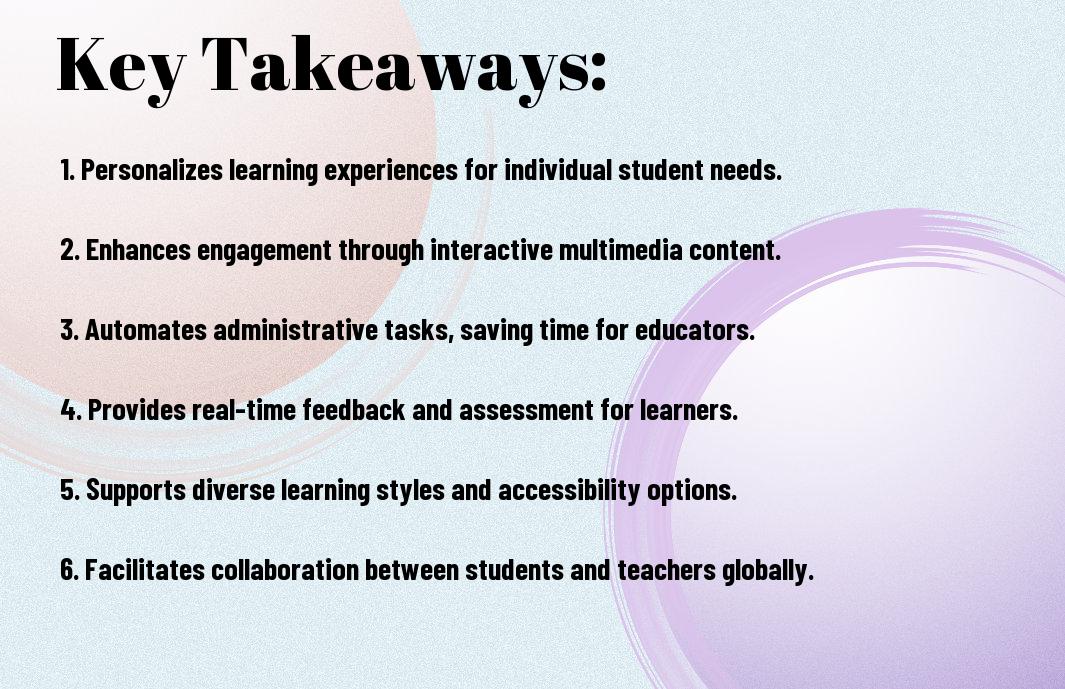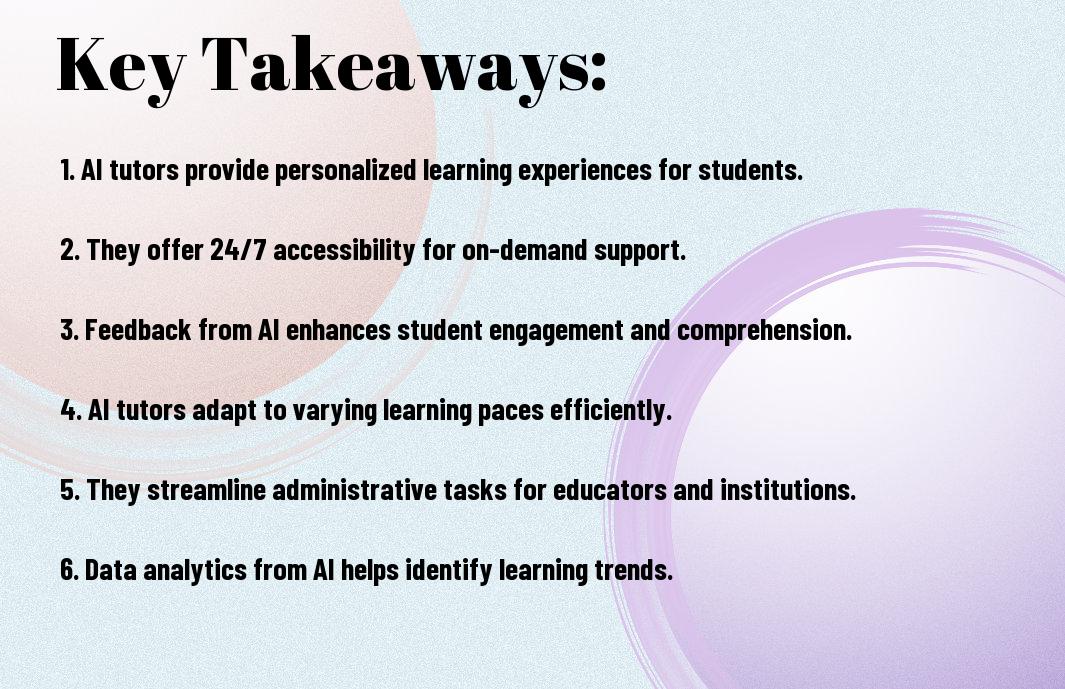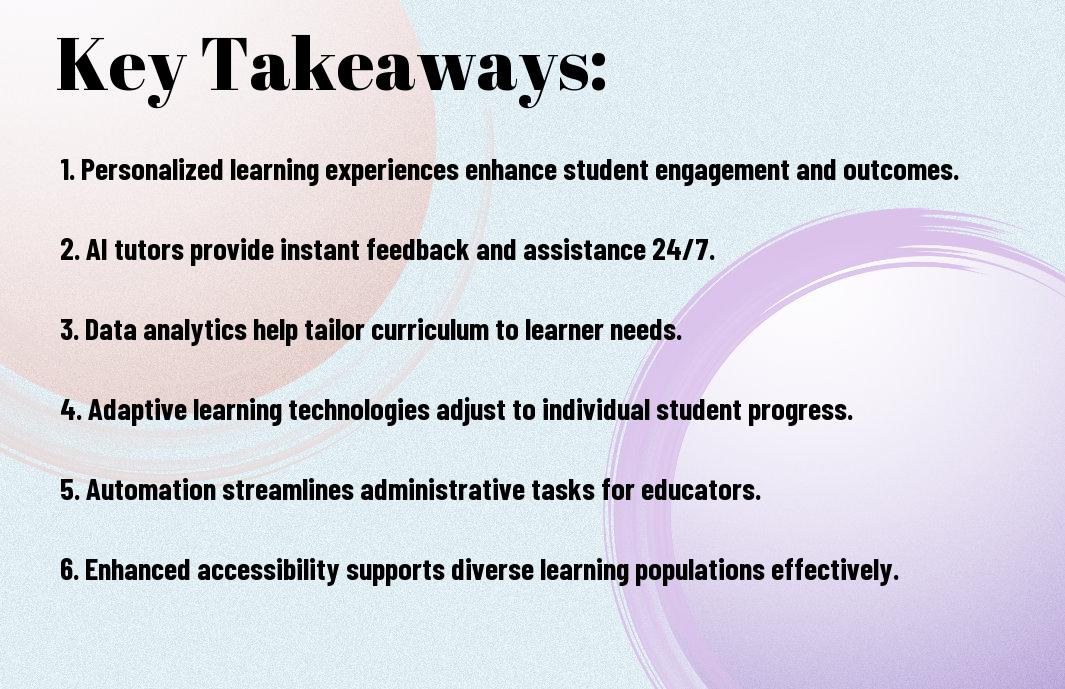As you navigate the evolving landscape of online education, you will inevitably encounter the concept of artificial intelligence (AI). You may wonder how AI is transforming the way you learn and interact with educational content. Your curiosity is justified, as AI is increasingly being integrated into online learning platforms, changing the dynamics of education. You will discover how AI enhances your learning experience, making it more personalized and efficient, in this exploration of its role in online education.
Key Takeaways:
- The integration of Artificial Intelligence (AI) in online education has transformed the learning experience, making it more personalized and interactive for students.
- AI-powered tools can help automate administrative tasks, such as grading and feedback, allowing instructors to focus on more hands-on and human-centric aspects of teaching.
- Intelligent tutoring systems can provide students with real-time feedback and adaptive learning pathways, helping to improve learning outcomes and increase student engagement.
- The use of machine learning algorithms can help educators identify knowledge gaps and develop targeted interventions to support students who are struggling with specific concepts or skills.
- As AI technology continues to evolve, it is likely to play an increasingly significant role in shaping the future of online education, enabling more efficient, effective, and accessible learning opportunities for students around the world.
The Impact of AI on Online Learning
A significant transformation is underway in online education, as AI assumes a prominent role in shaping your learning experience. You will notice a marked difference in the way you interact with course materials and instructors, as AI-powered tools facilitate more efficient and effective learning pathways.
Personalized Education
Along with the advent of AI, you can expect a more tailored approach to your education, as adaptive learning systems adjust to your individual needs and abilities. You will find that your learning experience is more engaging and relevant, as AI-driven platforms provide personalized recommendations and feedback.
Automated Grading Systems
An added benefit of AI in online education is the introduction of automated grading systems, which enable instructors to assess your work more accurately and efficiently. You will appreciate the prompt feedback and objective evaluation of your assignments, as AI-powered grading tools help to minimize bias and inconsistency.
Even as you become more accustomed to automated grading systems, you may wonder about the implications of relying on AI to evaluate your work. You can be assured that these systems are designed to enhance the learning process, freeing instructors to focus on providing guidance and support, while AI handles the more mundane aspects of grading and assessment, allowing you to concentrate on your academic goals.

Benefits of AI in Online Education
Clearly, the integration of AI in online education offers numerous advantages, as outlined in the Artificial Intelligence and the Future of Teaching and Learning report. You can explore how AI enhances your educational experience.
Increased Accessibility
Accessibly, online education platforms with AI provide you with flexible learning options, allowing you to access course materials and lectures at your convenience, making it easier to balance your studies with other responsibilities.
Enhanced Student Engagement
Below the surface of traditional teaching methods, AI-powered tools offer personalized learning experiences, enabling you to engage more effectively with course materials and interact with instructors in a more meaningful way.
To further enhance your engagement, AI-driven systems can analyze your learning patterns and adapt the curriculum to your needs, providing real-time feedback and guidance, which helps you stay motivated and focused on your academic goals.
The Role of AI in Course Development
Now, as you explore the role of AI in online education, you will discover its significance in course development, where AI-powered tools facilitate the creation of personalized learning paths and automate administrative tasks, enabling educators to focus on what matters most – teaching.
Intelligent Tutoring Systems
Structures like intelligent tutoring systems are being developed to provide one-on-one support to students, using AI algorithms to offer real-time feedback and guidance, thereby enhancing your learning experience.
Adaptive Learning Platforms
Tailoring learning to individual needs, adaptive learning platforms utilize AI to adjust the difficulty level of course materials, ensuring that you engage with content that is neither too easy nor too challenging, thus optimizing your learning outcomes.
Another advantage of adaptive learning platforms is that they allow you to learn at your own pace, with AI-driven systems continuously assessing your knowledge gaps and suggesting additional resources to fill them, thereby making your learning journey more efficient and effective.
Challenges and Limitations of AI in Online Education
Not everything about AI in online education is perfect, as you will encounter several challenges that can hinder its effectiveness, and it is important to consider these limitations when implementing AI in your online learning environment.
Technical Issues
Any attempt to integrate AI into online education platforms can be fraught with technical difficulties, such as system crashes, slow loading times, and compatibility issues, which can frustrate you and hinder your learning experience.
Data Privacy Concerns
About the use of AI in online education, you should be aware that your personal data may be at risk, as AI systems often rely on collecting and analyzing large amounts of student data, which can be vulnerable to cyber attacks and unauthorized access.
Issues related to data privacy are a significant concern when using AI in online education, as you may be worried about how your data is being used, shared, and protected, and it is important to ensure that your online learning environment has robust security measures in place to safeguard your personal information.

The Future of AI in Online Education
Keep in mind that the integration of AI in online education is an ongoing process, and you can expect significant advancements in the coming years, transforming the way you learn and interact with educational materials.
Emerging Trends
Contrary to traditional methods, AI-powered adaptive learning systems are gaining popularity, allowing you to personalize your learning experience and paving the way for more effective education.
Potential Applications
Potentially, AI can revolutionize online education by providing you with real-time feedback, automated grading, and intelligent tutoring systems, making your learning journey more efficient and engaging.
In addition, as you explore the potential applications of AI in online education, you will discover that it can help you identify knowledge gaps, offer customized learning paths, and facilitate collaboration with peers, ultimately enhancing your overall educational experience.
Implementation Strategies for AI in Online Education
All educators and institutions seeking to integrate AI into their online platforms can learn from existing research, such as the article on AI and College: The Impact on Online Learning, to inform your decisions.
Teacher Training
Beneath the surface of successful AI implementation lies effective teacher training, which enables you to harness the full potential of AI tools and create engaging online learning experiences.
Infrastructure Development
Accross your institution, you will need to assess and develop your technological infrastructure to support AI-powered online education, ensuring seamless integration and optimal performance.
In addition, as you develop your infrastructure, you should prioritize scalability, security, and accessibility to guarantee that your online learning environment is reliable and efficient, allowing you to focus on what matters most – providing high-quality education to your students.
Summing up
Conclusively, as you examine into online education, you will find that AI plays a significant role in shaping your learning experience. You can explore more about the impact of AI on online learning through resources such as How AI Impacts Online Learning, which provides valuable insights into the future of education, and how you can leverage AI to enhance your online learning journey.
FAQ
Q: What is the role of AI in online education, and how is it transforming the learning experience?
A: The role of AI in online education is multifaceted, involving the use of artificial intelligence to create personalized learning paths, automate grading, and enhance student engagement. AI algorithms analyze student data to identify knowledge gaps and learning patterns, enabling the creation of tailored educational content. This not only improves learning outcomes but also makes the educational process more efficient and accessible. Moreover, AI-powered chatbots and virtual assistants provide immediate support to students, answering queries and offering guidance throughout their learning journey.
Q: How does AI contribute to improving accessibility in online education, particularly for students with disabilities?
A: AI plays a significant role in making online education more accessible, especially for students with disabilities. For instance, AI-powered tools can convert text-to-speech, enabling visually impaired students to listen to written content. Additionally, speech-to-text functionalities assist students with mobility or dexterity impairments to interact with digital materials more easily. AI-driven platforms can also automatically generate closed captions for video lectures, ensuring that students with hearing impairments can follow along. By incorporating these features, AI helps in creating a more inclusive online learning environment.
Q: Can AI replace human teachers in online education, or is it seen as a complementary tool to enhance teaching methods?
A: While AI is revolutionizing online education, it is not intended to replace human teachers. Instead, AI is viewed as a complementary tool designed to enhance teaching methods and support the role of educators. AI can handle administrative tasks such as grading and data analysis, freeing up instructors to focus on what matters most: providing high-quality instruction, mentoring, and creating meaningful interactions with students. The integration of AI in online education aims to augment the capabilities of teachers, making the educational process more effective, engaging, and student-centered, rather than replacing the invaluable human element that educators bring to the learning experience.



